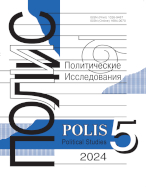Political Transformations in Russia and in Ukraine in the Years 2004 to 2006:
Causes and Possible Consequences
Lapkin V.V.,
Cand. Sci. (Chem.), Leading Researcher, Primakov Institute of World Economy and International Relations, Russian Academy of Sciences, First Deputy Editor‑in‑Chief, Polis. Political Studies. Moscow, Russia, vvlh@politstudies.ru
elibrary_id: 43429 | ORCID: 0000-0002-0775-2630 | RESEARCHER_ID: AAB-9386-2021
Pantin V.I.,
Dr. Sci. (Philos.), Head of Department, Primakov National Research Institute of World Economy and International Relations, Russian Academy of Sciences, Moscow, Russia, v.pantin@mail.ru
elibrary_id: 74145 | ORCID: 0000-0002-4218-4579 | RESEARCHER_ID: K-5736-2017
DOI: 10.17976/jpps/2007.01.08
Lapkin V.V., Pantin V.I. Political Transformations in Russia and in Ukraine in the Years 2004 to 2006: Causes and Possible Consequences . – Polis. Political Studies. 2007. No. 1. https://doi.org/10.17976/jpps/2007.01.08
The article contains comparative analysis of political changes that have been taking place in recent years in Russia and in Ukraine. Among the factors that have predetermined divergence of the two countries’ political trajectories, particular attention is given to the differences in the modes of overcoming disfunctions of the respective institutional systems by making resort to resources of personalist regimes. Differences at the level of the trends of political dynamics have also been noted: in the one case strengthening (institutionalization of its kind) of the personalism of the presidential power is stated, in the other – its being constantly washed out. Prospects of the political reform in Ukraine and probable development of the political process in Russia in the course of the 2007 to 2008 electoral cycle have been analyzed, too, in the contexts of the changes in global politics, of the dynamics of the intra-elite processes and of the splits and contradictions of mass consciousness in both countries.
See also:
Peregudov S.P.,
Transnational Corporations on the Way to Corporate Citizenship. – Polis. Political Studies. 2004. No3
Fyodorov K.G.,
The Policy in the Sphere of Local Taxation in Russia. – Polis. Political Studies. 2003. No4
Peregudov S.P.,
Corporate Capital and Power Institutions: Who Plays the Master?. – Polis. Political Studies. 2002. No5
Sergeev V.M.,
How Are Social Changes Possible? (Prolegomena to a Statistical Theory of Social Networks). – Polis. Political Studies. 2001. No6
Kolosov V.A., Borodulina N.A.,
Electoral Preferences in Cities and Large Towns of Russia: Types and Stability. – Polis. Political Studies. 2004. No4





.jpg)






 print
print
.jpg)
.jpg)